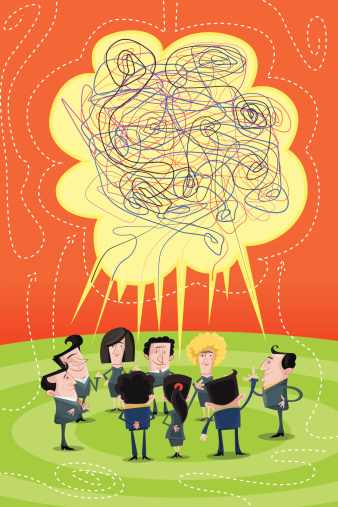 As a society, we are inclined to attach shorthand labels to everything from parenting (Tiger Mom, Soccer Mom, Helicopter Parents) to politics (Red States and Blue States, the War on Drugs). It’s a function of our human brains that we are wired to categorize concepts in order to make sense of the world, but sometimes it feels like we’ve put this tendency on steroids. Too often people assume a label is sufficient to explain complex social phenomena (Obamacare, the Arab Spring) or to fully define an individual or group of people (Boomers, Gen X’ers, Millenials). We confuse sound bites with explanations. Think about the times you’ve seen two shorthand labels in a headline, maybe with a “vs.” in between, and believed there was no need to read further to understand the situation (Israeli vs. Palestinian conflict). It is easy to become polarized instead of thoughtful, rigid instead of nuanced.
As a society, we are inclined to attach shorthand labels to everything from parenting (Tiger Mom, Soccer Mom, Helicopter Parents) to politics (Red States and Blue States, the War on Drugs). It’s a function of our human brains that we are wired to categorize concepts in order to make sense of the world, but sometimes it feels like we’ve put this tendency on steroids. Too often people assume a label is sufficient to explain complex social phenomena (Obamacare, the Arab Spring) or to fully define an individual or group of people (Boomers, Gen X’ers, Millenials). We confuse sound bites with explanations. Think about the times you’ve seen two shorthand labels in a headline, maybe with a “vs.” in between, and believed there was no need to read further to understand the situation (Israeli vs. Palestinian conflict). It is easy to become polarized instead of thoughtful, rigid instead of nuanced.
I recently attended the Fetzer Symposium, a multidisciplinary gathering of Collaborative professionals, mediators, judges and others whose professional lives have been devoted to creativity and healing. Each of the fifty participants was there because they were attracted to the theme: “Divorce: What does Love have to do With It?” A rich tapestry of conversations, ideas and initiatives was created. Professional labels just weren’t that important—-everyone there was committed to reducing conflict in divorce. I thought of the tendency we have to label family law processes and sometimes pit them against each other (collaborative vs. cooperative vs. adversarial vs. mediated vs. litigated). Not only does it waste precious energy and create unnecessary conflict to oppose someone based solely on the label attached to their work, such animosity can also prevent us from looking further, going past the label to find our common values in helping families through crisis. There is plenty of room at the family law table.
I felt honored and hopeful to be among so many family law professionals of all stripes who have earned the right to add
peacemaking to other adjectives describing their work, not as a shorthand label but as an invitation to go beyond the label.
 As a society, we are inclined to attach shorthand labels to everything from parenting (Tiger Mom, Soccer Mom, Helicopter Parents) to politics (Red States and Blue States, the War on Drugs). It’s a function of our human brains that we are wired to categorize concepts in order to make sense of the world, but sometimes it feels like we’ve put this tendency on steroids. Too often people assume a label is sufficient to explain complex social phenomena (Obamacare, the Arab Spring) or to fully define an individual or group of people (Boomers, Gen X’ers, Millenials). We confuse sound bites with explanations. Think about the times you’ve seen two shorthand labels in a headline, maybe with a “vs.” in between, and believed there was no need to read further to understand the situation (Israeli vs. Palestinian conflict). It is easy to become polarized instead of thoughtful, rigid instead of nuanced.
As a society, we are inclined to attach shorthand labels to everything from parenting (Tiger Mom, Soccer Mom, Helicopter Parents) to politics (Red States and Blue States, the War on Drugs). It’s a function of our human brains that we are wired to categorize concepts in order to make sense of the world, but sometimes it feels like we’ve put this tendency on steroids. Too often people assume a label is sufficient to explain complex social phenomena (Obamacare, the Arab Spring) or to fully define an individual or group of people (Boomers, Gen X’ers, Millenials). We confuse sound bites with explanations. Think about the times you’ve seen two shorthand labels in a headline, maybe with a “vs.” in between, and believed there was no need to read further to understand the situation (Israeli vs. Palestinian conflict). It is easy to become polarized instead of thoughtful, rigid instead of nuanced.
